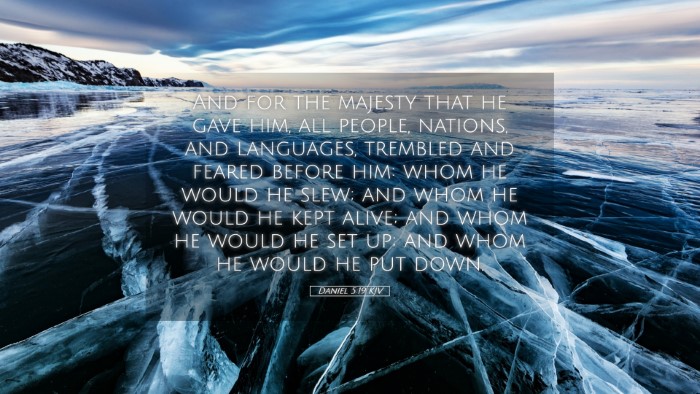Commentary on Daniel 5:19
Verse Context: Daniel 5:19 states, "And for the majesty that he gave him, all peoples, nations, and languages trembled and feared before him: whom he would he slew; and whom he would he kept alive; and whom he would he set up; and whom he would he put down." This verse occurs in the account of Belshazzar’s feast, where the king’s blasphemous actions provoke divine judgment.
Examination of the Text
In this verse, we find a reflection on the power and authority that God had granted to Nebuchadnezzar, the former king of Babylon. It illustrates the vast influence he wielded over nations and the fear he instilled in those around him. This is an important aspect of the sovereignty of God, who raises and lowers rulers according to His purpose.
Insights from Matthew Henry
Matthew Henry emphasizes the sovereignty of God in the establishment of kings and the power they hold. He explains that Nebuchadnezzar was a powerful monarch whose authority was ordained by God. Henry notes that this power was acknowledged by all nations, showing the universal acknowledgment of authority that God bestows upon leaders, which is consistent with the biblical teachings on governance.
- Divine Endorsement: Nebuchadnezzar’s power came as a result of God's favor, underscoring the belief that rulers are ultimately accountable to divine will.
- Human Fear: The fear and trembling of people before Nebuchadnezzar signify not only his authority but also the respect commanded by divine institutions, reflecting the connection between divine right and human reverence.
Insights from Albert Barnes
Albert Barnes provides a detailed exposition on the consequences of Nebuchadnezzar’s reign and the implications of this verse. He points out that the extent of power described gives insight into God’s governance of earthly affairs:
- Universal Fear: The phrase "all peoples" denotes the widespread influence of Nebuchadnezzar's rule, indicating that the king’s authority was not limited but rather had far-reaching implications that affected many.
- God’s Divine Limits: Barnes underscores that while Nebuchadnezzar was given immense power, it came with divine limits. His downfall resulted from pride, as emphasized later in the Chapter, implying that God opposes the proud but gives grace to the humble.
Insights from Adam Clarke
Adam Clarke elaborates on the nature of kingship depicted in this verse and its themes of divine appointment and authority:
- The Rule of Law: Clarke notes that Nebuchadnezzar exercised his authority as both lawmaker and executor, which was a common trait of ancient rulers. This highlights the potential abuses of power residing in absolute authority.
- Reflection on Belshazzar: Clarke emphasizes the contrast between Nebuchadnezzar’s recognized authority and Belshazzar’s mockery of it, showing how the later king’s disregard for his predecessor's divine appointment ultimately led to his demise.
Theological Reflections
This verse invites profound theological reflection regarding God’s sovereignty, human governance, and the moral responsibilities of rulers. The story of Nebuchadnezzar is one of exaltation followed by humiliation, illustrating the biblical principle of humility before the Lord. Believers are encouraged to recognize that all authority is derived from God, and rulers are ultimately accountable to Him.
This passage also serves as a warning: the pride and arrogance of earthly rulers can provoke God’s judgment. Belshazzar’s neglect and disrespect for the lessons learned from Nebuchadnezzar's life underscore the need for leaders to heed divine instruction and maintain humility.
Application for Today’s Context
For pastors and theologians, Daniel 5:19 is a compelling text to discuss the nature of leadership in today's world. It points to the reality that all leaders, whether political or ecclesiastical, must understand the weight of their responsibilities before God. The scriptural admonition to maintain a heart of humility and integrity remains relevant in modern contexts.
In addition, the congregational application encourages believers to pray for their leaders, recognizing the heavy toll of authority and the spiritual warfare inherent in leadership positions. By fostering a spirit of humility and reliance on divine wisdom, leaders may steer their communities toward righteousness and justice, reflecting the proper exercise of authority.


